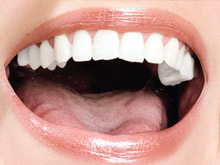 |
Saliva is an essential ingredient which we all need to moisten and digest food, and also cleanse our mouths. The watery nature of saliva prevents infection by controlling bacteria and fungi in the mouth. If we don’t produce enough saliva our mouth gets dry, uncomfortable and produces a burning sensation. This is called xerostomia or simply, dry mouth. |
Dry Mouth Problems
Those with xerostomia often complain of problems with eating, speaking, swallowing and wearing dentures. Dry, crumbly foods, such as cereals and crackers, may be particularly difficult to chew and swallow. Denture wearers may have problems with denture retention, denture sores and the tongue sticking to the palate. Taste disorders, a painful tongue and an increased need to drink water, especially at night are typical symptoms.
Xerostomia can lead to more germs in the mouth, enlargement of the parotid gland, inflammation and fissuring of the lips, ulcers of the tongue, infection of the salivary gland, foul smell, and cracking and fissuring inside the mouth.
Since saliva controls the bacteria and fungi in your mouth, dry mouth can significantly increase chances of tooth decay and infection in mouth - leading to other complications. In some cases, dry mouth can also be a sign of serious health problems and diseases.
6 Dry Mouth Causes
Medications: More than 400 commonly used drugs can cause xerostomia. The main culprits are antihistamines, antidepressants, anticholinergics, anorexiants, antihypertensives, antipsychotics, anti-Parkinson agents, diuretics and sedatives. Others which can exert dehydrating effects are antiemetics, antianxiety agents, decongestants, analgesics, antidiarrheals, bronchodilators and skeletal muscle relaxants. While there are many drugs that affect the quantity and/or quality of saliva, these effects are generally not permanent.
Certain diseases: The most common disease causing xerostomia is Sjögren's Syndrome (SS), a chronic inflammatory autoimmune disease that occurs predominantly in postmenopausal women.
Cancer therapy: Xerostomia is the most common toxicity associated with standard fractionated radiation therapy to the head and neck. Certain cancer chemotherapeutic drugs can also change the composition and flow of saliva, resulting in xerostomia, though these changes are usually temporary.
Dehydration: Impaired water intake, emesis, diarrhoea, etc. are the main culprits.
Psychogenic causes: Depression, anxiety, stress or fear, can also result in xerostomia. Alzheimer's disease or stroke may alter the ability to perceive oral sensations.
Dry mouth is often exacerbated by activities such as hyperventilation (over breathing when under stress), breathing through the mouth, smoking or drinking alcohol. Obesity and acne are potent reasons too.
Household Treatment
Drink plenty of water: This may seem like an obvious treatment, but you may be surprised to know that most people don’t drink the recommended quantity of two litres of water everyday. Add to that the caffeinated beverages we consume, causing dry mouth, headaches, fatigue, dry skin and worse.
Candies and Gums: Chewing sugarfree gums or sucking on sugarfree candies can stimulate saliva production and thus prevent dry mouth. Sour candies seem to work best. If candies or gum aren't for you, you can try sucking on an olive pit or lemon rind.
Eating and Drinking: When eating meals or snacks, it's important to drink often. Water or sugar-free juices are good choices. Not only will the fluids help you chew and swallow your food (and contribute to your daily recommended water intake), they can also help enhance the taste of your food.
Dental Hygiene: Brushing your teeth properly (with toothpaste containing fluoride) after every meal and flossing once a day can help protect your teeth, gums and mouth tissue and help relieve the symptoms of dry mouth. |
 |
Dr. Sameer Azad Mahendra is Chief Consultant, Dental & Maxillofacial Surgery at Apollo Hospitals, Secunderabad |
|